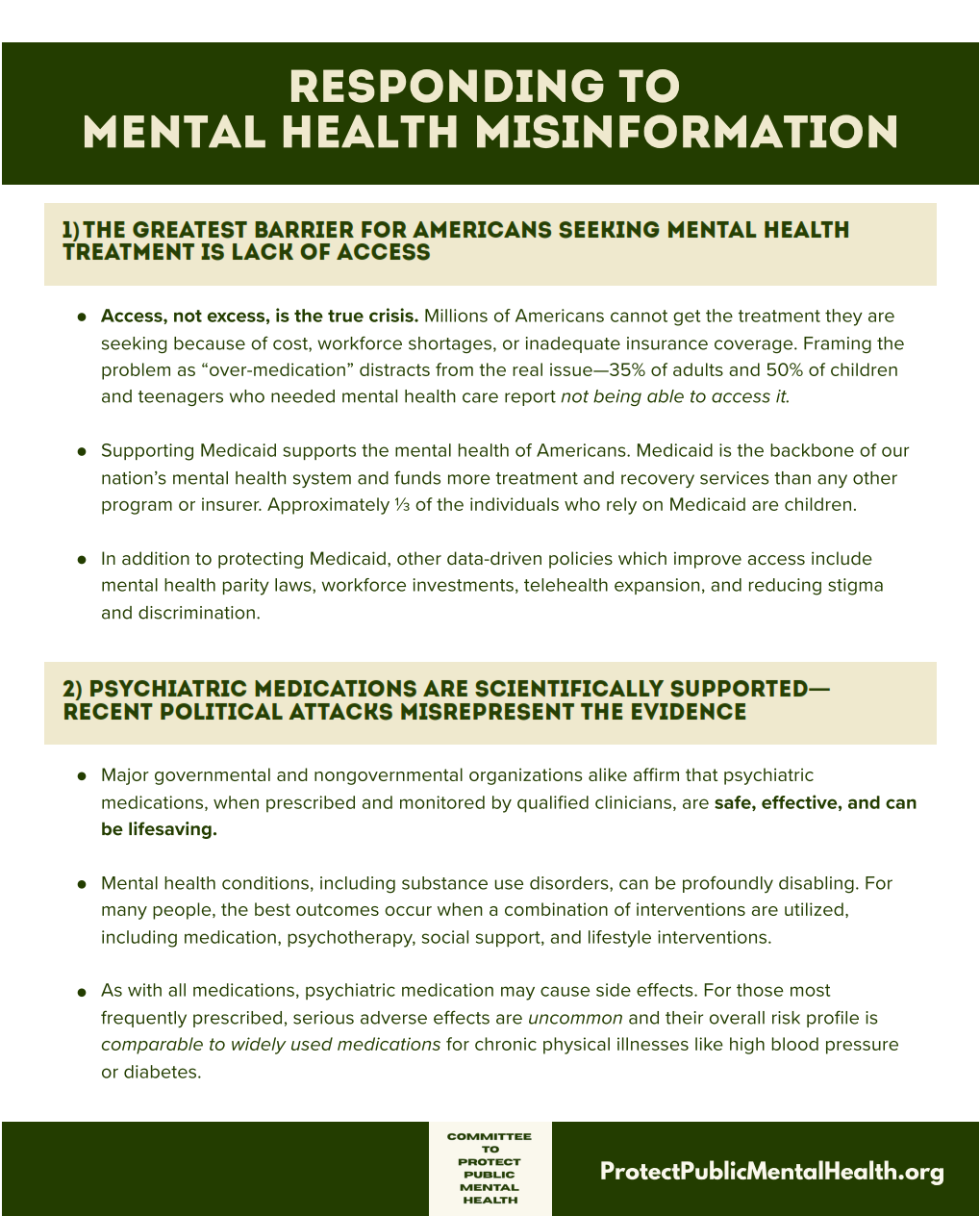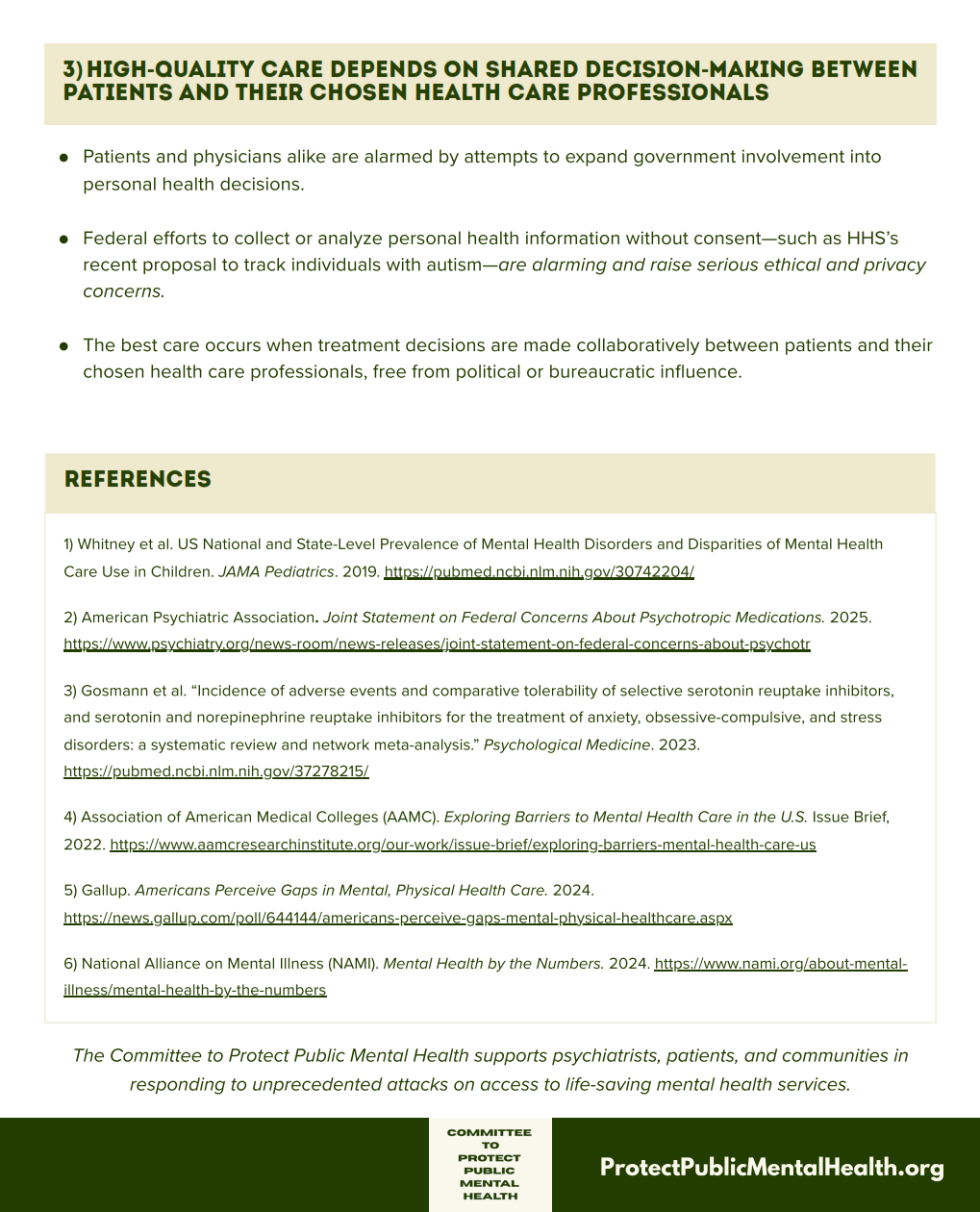Responding to Mental Health Misinformation
There’s been a lot of misinformation out there about mental health recently, so here are the facts:
1) The greatest barrier for Americans seeking mental health treatment is lack of access
Access, not excess, is the true crisis. Millions of Americans cannot get the treatment they are seeking because of cost, workforce shortages, or inadequate insurance coverage. Framing the problem as “over-medication” distracts from the real issue—35% of adults and 50% of children and teenagers who needed mental health care report not being able to access it.
Supporting Medicaid supports the mental health of Americans. Medicaid is the backbone of our nation’s mental health system and funds more treatment and recovery services than any other program or insurer. Approximately ⅓ of the individuals who rely on Medicaid are children.
In addition to protecting Medicaid, other data-driven policies which improve access include mental health parity laws, workforce investments, telehealth expansion, and reducing stigma and discrimination.
2) Psychiatric medications are scientifically supported—recent political attacks misrepresent the evidence
Major governmental and nongovernmental organizations alike affirm that psychiatric medications, when prescribed and monitored by qualified clinicians, are safe, effective, and can be lifesaving.
Mental health conditions, including substance use disorders, can be profoundly disabling. For many people, the best outcomes occur when a combination of interventions are utilized, including medication, psychotherapy, social support, and lifestyle interventions.
As with all medications, psychiatric medication may cause side effects. For those most frequently prescribed, serious adverse effects are uncommon and their overall risk profile is comparable to widely used medications for chronic physical illnesses like high blood pressure or diabetes.
3) High-quality care depends on shared decisionmaking between patients and their chosen health care professionals
Patients and physicians alike are alarmed by attempts to expand government involvement into personal health decisions.
Federal efforts to collect or analyze personal health information without consent—such as HHS’s recent proposal to track individuals with autism—are alarming and raise serious ethical and privacy concerns.
The best care occurs when treatment decisions are made collaboratively between patients and their chosen health care professionals, free from political or bureaucratic influence.
References
1) Whitney et al. US National and State-Level Prevalence of Mental Health Disorders and Disparities of Mental Health Care Use in Children. JAMA Pediatrics. 2019. https://pubmed.ncbi.nlm.nih.gov/30742204/
2) American Psychiatric Association. Joint Statement on Federal Concerns About Psychotropic Medications. 2025. https://www.psychiatry.org/news-room/news-releases/joint-statement-on-federal-concerns-about-psychotr
3) Gosmann et al. “Incidence of adverse events and comparative tolerability of selective serotonin reuptake inhibitors, and serotonin and norepinephrine reuptake inhibitors for the treatment of anxiety, obsessive-compulsive, and stress disorders: a systematic review and network meta-analysis.” Psychological Medicine. 2023. https://pubmed.ncbi.nlm.nih.gov/37278215/
4) Association of American Medical Colleges (AAMC). Exploring Barriers to Mental Health Care in the U.S. Issue Brief, 2022. https://www.aamcresearchinstitute.org/our-work/issue-brief/exploring-barriers-mental-health-care-us
5) Gallup. Americans Perceive Gaps in Mental, Physical Health Care. 2024. https://news.gallup.com/poll/644144/americans-perceive-gaps-mental-physical-healthcare.aspx
6) National Alliance on Mental Illness (NAMI). Mental Health by the Numbers. 2024. https://www.nami.org/about-mental-illness/mental-health-by-the-numbers

